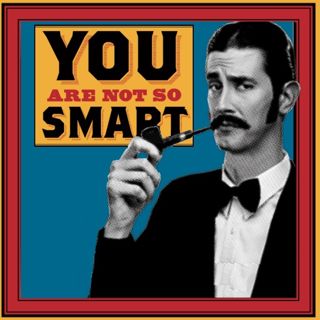
322 - Intellectual Humility - Tenelle Porter
Can intellectual humility be measured? What influences it and affects it, limits it and enhances it? What even is it, scientifically speaking? We explore all of this and then play an episode of How to Be A Better Human featuring psychologist Tenelle Porter telling comedian Chris Duffy how she is researching how to conduct better research into intellectual humility.Previous EpisodesTranscript at TEDHow to Be A Better HumanThe Gateway Drugs to Intellectual HumilityTenelle Porter's ResearchTenelle Porter's WebsiteThe Illusion of Explanatory DepthKitted ShopThe Story of KittedHow Minds ChangeDavid McRaney’s BlueSkyDavid McRaney’s TwitterYANSS TwitterShow NotesNewsletterPatreon Hosted by Simplecast, an AdsWizz company. See pcm.adswizz.com for information about our collection and use of personal data for advertising.
15 Sep 20251h 7min

321 - Easy Crafts for the Insane - Kelly Williams Brown (rebroadcast)
This episode is about suicide prevention and awareness. Author Kelly Williams Brown tells us about her book, Easy Crafts for the Insane, in which she recounts how, after she gained fame and success as a NYT bestselling author, her world came apart. Then an anti-anxiety-drug-induced manic state nearly ended her life.988Suicide Prevention MonthKelly Williams Brown's WebsiteEasy Crafts for the InsaneKelly's TwitterKelly's InstagramKelly in Vanity FairGratitude Journaling StudySeneca on Being WretchedThe Story of KittedHow Minds ChangeDavid McRaney’s BlueSkyDavid McRaney’s TwitterYANSS TwitterShow NotesNewsletterPatreon Hosted by Simplecast, an AdsWizz company. See pcm.adswizz.com for information about our collection and use of personal data for advertising.
1 Sep 20251h 18min

320 - Misguided - Matthew Facciani
What is misinformation? How does it differ from disinformation or just plain ‘ole propaganda? How do we protect ourselves from people with nefarious intentions using all of these things to affect our thoughts, feelings, and behavior? That’s what we discuss in this episode with Matthew Facciani, social scientist and author of Misguided: Where Misinformation Starts, How it Spreads, and What We Can Do About It.Matthew Facciani's WebsiteThe Misguided PodcastMisguidedKitted ShopThe Story of KittedHow Minds ChangeDavid McRaney's BlueSkyDavid McRaney’s TwitterYANSS TwitterShow NotesNewsletterPatreon Hosted by Simplecast, an AdsWizz company. See pcm.adswizz.com for information about our collection and use of personal data for advertising.
18 Aug 20251h 8min

319 - Love Factually - Eli Finkel and Paul Eastwick
Two psychologists who study love, relationships, and human mating behavior pick apart the movie "The Notebook" and tell us what it gets right and what it gets wrong when it comes to portraying how humans actually, truly think, feel, and behave. Eli Finkel and Paul Eastwick are the cohosts of the Love Factually podcast, a show that discusses the romantic/scientific accuracy of movies, and on this episode we listen in as they examine one of the most popular romance movies of all time.Love Factually WebsiteLove Factually SubstackEli Finkel's WebsitePaul Eastwick's WebsiteKitted ShopThe Story of KittedHow Minds ChangeDavid McRaney's BlueSkyDavid McRaney’s TwitterYANSS TwitterShow NotesNewsletterPatreon Hosted by Simplecast, an AdsWizz company. See pcm.adswizz.com for information about our collection and use of personal data for advertising.
4 Aug 20251h 6min

317 - Don't Talk About Politics - Sarah Stein Lubrano
Sarah Stein Lubrano tells us about her new book, Don't Talk About Politics, which urges us not to lose hope or become frozen in frustration when it comes to polarization and faulty discourse because the good news is that we don't just know, scientifically, why the marketplace of ideas is currently failing us, we know how, scientifically, we can do better. Sarah Stein Lubrano's WebsiteDon't Talk About PoliticsMotivated Numeracy PaperHow Minds ChangeDavid McRaney’s TwitterYANSS TwitterShow NotesNewsletterPatreon Hosted by Simplecast, an AdsWizz company. See pcm.adswizz.com for information about our collection and use of personal data for advertising.
7 Juli 20251h 10min

316 - Cultures of Growth - Mary C. Murphy (rebroadcast)
In this episode we welcome psychologist Mary C. Murphy, author of Cultures of Growth, who tells us how to create institutions, businesses, and other groups of humans that can better support collaboration, innovation, performance, and wellbeing. We also learn how, even if you know all about the growth mindset, the latest research suggests you not may not be creating a culture of growth despite what feels like your best efforts to do so. Mary Murphy’s WebsiteCultures of GrowthCarol Dweck at GooglePaper: A Culture of GeniusHow Minds ChangeDavid McRaney’s TwitterYANSS TwitterShow NotesNewsletterPatreon Hosted by Simplecast, an AdsWizz company. See pcm.adswizz.com for information about our collection and use of personal data for advertising.
23 Juni 20251h 8min

315 - May Contain Lies - Alex Edmans
Alex Edmans, a professor of finance at London Business School, tells us how to avoid the Ladder of Misinference by examining how narratives, statistics, and articles can mislead, especially when they align with our preconceived notions and confirm what we believe is true, assume is true, and wish were true.Alex Edmans May Contain LiesWhat to Test in a Post Trust WorldHow Minds ChangeDavid McRaney’s TwitterDavid McRaney’s BlueSkyYANSS TwitterYANSS FacebookNewsletterKittedPatreon Hosted by Simplecast, an AdsWizz company. See pcm.adswizz.com for information about our collection and use of personal data for advertising.
9 Juni 202539min





















